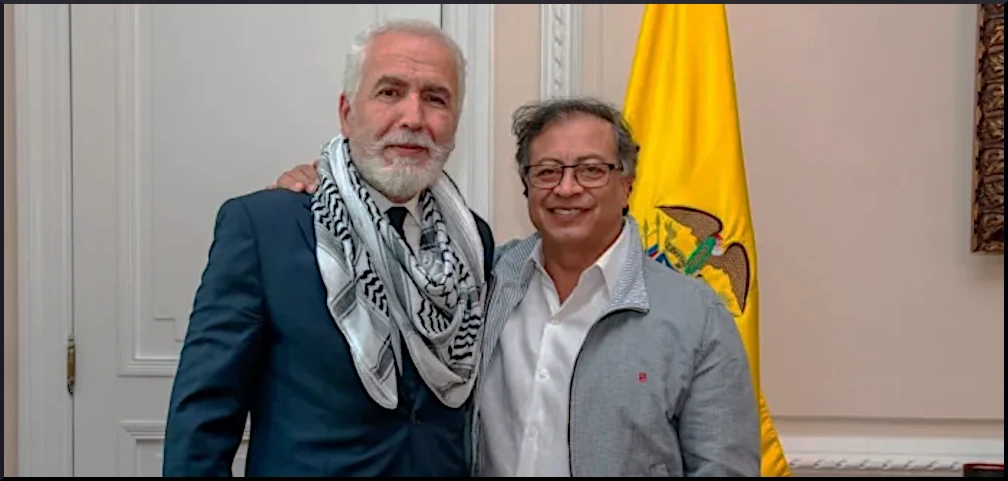by John Perry, published on CovertAction Magazine, November 1, 2024
Governments in Latin America have been at the forefront of opposition to Israel’s genocide in Gaza, and several of those which have done so suddenly face new threats, even including attempted coups. Adrienne Pine, a professor at the California Institute of Integral Studies, said during a recent webinar hosted by the Nicaragua Solidarity Coalition that “anybody who stands with Palestine is going to be attacked in Latin America by the U.S. and by Zionists.”
Recent events appear to show the truth of her remarks.
Of the 165 countries that recognize Israel, only four have officially cut diplomatic ties with the country since it began its Gaza offensive, and all of them are Latin American: Bolivia, Belize, Colombia and Nicaragua (Venezuela severed its ties with Israel in 2009 while Cuba broke off relations during the Yom Kippur War of 1973).
A further eight countries have withdrawn their diplomats from Tel Aviv since October 7, 2023, of which Chile, Brazil, and Honduras are from Latin America.

[Source: youtube.com]
Israel’s ties with Latin America are longstanding. As well as extensive trading relationships, Israel has often backed repressive regimes or undermined progressive governments. In “Israel’s Latin American trail of terror” Aljazeera summarises its grisly history in the region, from training death squads in El Salvador to supplying the arms used to massacre Guatemalan campesinos.
Israel has often acted as a surrogate for Washington when the U.S. doesn’t want to “get its hands dirty”. In Nicaragua, it supplied arms to the “Contra” forces that attempted to overthrow the Sandinista revolution in the 1980s. In Honduras, it helped prevent President Mel Zelaya from returning to power after he was ousted in the 2009 coup.
When the country then became a “narcostate”, its President Juan Orlando Hernández (now serving a lengthy prison term in the U.S. for drug-trafficking), became Israel’s closest ally in the region. In Colombia, it sold massive quantities of arms to paramilitary groups which destabilized the country during decades of widespread violence.
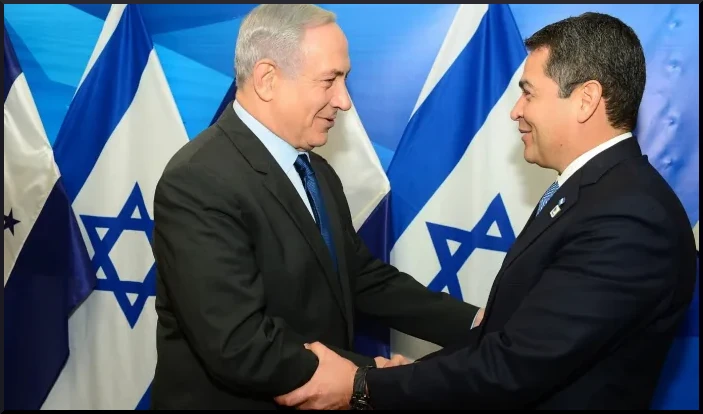
Nicaragua is a “platform for terrorism”
Israel’s history means it is well placed to retaliate when Latin American governments attack it as genocidal. The example of Nicaragua is the clearest. The country was the first to join the action taken by South Africa in bringing Israel before the International Court of Justice (ICJ) at the beginning of this year.
It followed this by taking its own ICJ case against Germany, for supplying arms to Israel. The ICJ’s provisional ruling had the initial effect of reducing the flow of German weapons until Israel later signed a “commitment” that they would not be used in violation of the genocide convention.
Most recently, on October 11, President Daniel Ortega announced the breaking of diplomatic relations with Israel, calling Prime Minister Netanyahu a “son of the devil” and comparing him to Hitler.
The attempted retribution was swift. Four days after Ortega’s speech, the Israeli consul in neighboring Costa Rica, Amir Rockman, gave an interview in which he claimed that “Iranian interests and, in particular, those of the terrorist organization Hezbollah, are installed in Nicaragua.”
He further claimed that “radical Iranian forces and terror groups operate freely” in Nicaragua, although he was not asked for, nor did he provide, any evidence.
Given that some 3,000 kilometers separate Nicaragua from the U.S. border, the usefulness to a “terror group” of being able to operate in a small Central American country is far from clear.
Right-wing outlets opposed to the Sandinista government gleefully elaborated on what Rockman said. Mijal Gur-Aryeh, Israel’s ambassador in Costa Rica, told La Prensa that “Nicaragua had been converted into a platform for terrorism in the region.” A few days later she added that Hezbollah had “bases” in Venezuela and Bolivia as well as Nicaragua.
This enabled one of the best-known opponents of Nicaragua’s Sandinista government, Felix Maradiaga, to call for the Sandinista party to be declared a terrorist organization. “In the short term, this could aggravate the delicate economic situation in Nicaragua,” he said. “But I firmly believe that any temporary sacrifice will be smaller than the bigger benefit of weakening a regime which has used the country as a platform for extreme and illegal activities.”
Nicaragua’s Sandinista government rejected Israel’s allegations on October 21. While there is, as of yet, no evidence that Israel’s claims have resonance in Washington, if Nicaragua were to be designated a “state sponsor of terrorism” (SSoT) the effects could be very serious.
It could potentially do even more harm to its economy than the current raft of US. sanctions, affecting its rapidly growing tourism industry and perhaps much more. A warning is provided by the severe damage done to Cuba’s economy after it was added to the SSoT list, which added to the already considerable damage caused by the longstanding U.S. blockade.
An SSoT designation also gives license to U.S. and other Western law enforcement agencies to persecute those working in solidarity with a listed country, as has already happened to those supporting Palestine (with solidarity groups often falsely accused of supporting Hamas).
Nicaragua survived an attempted coup in 2018, and Ortega has made no suggestion that a second coup is on the cards. However, both Honduras and Colombia have made such recent claims. We consider Honduras next.
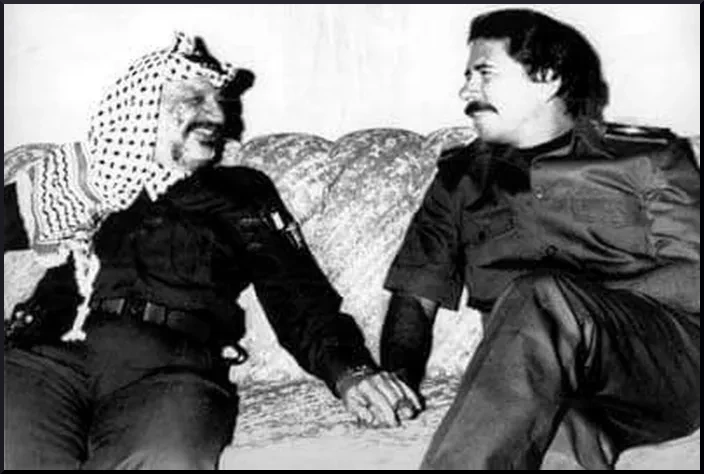
A new “coup attempt” in Honduras?
Adrienne Pine’s comments about attacks on countries supporting Palestine followed on from her description of Israel’s role in supporting the neoliberal regime that ran Honduras from 2009 until the Libre party finally ousted it in the 2021 election.
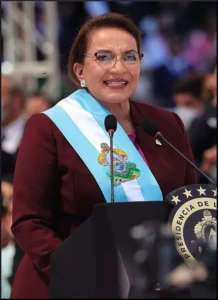
Following both these moves, Castro has come under intense pressure on different fronts which, she says, amounts to an attempted coup. In response, she has ended the extradition treaty between her country and the United States (the same treaty that allowed her predecessor, Hernández, to be sent for trial in New York). Castro herself has direct experience of a coup, since it was her husband, Mel Zelaya, who was deposed as president in 2009 by the U.S.-backed military and forced out of the country. It is hardly surprising that she is alert to the possibility of a second one.
Who orchestrated the coup attempt? Suspicion falls on Washington’s ambassador in Tegucigalpa, Laura Dogu, who has a track record in this respect. She was the ambassador in Nicaragua prior to the 2018 coup attempt, and since coming to Honduras in 2022, has made strong links with capitalist-class opponents of Castro’s Libre party, just as she did in Managua with business leaders hostile to the Sandinista revolution.
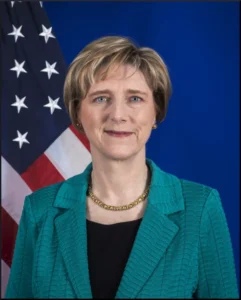
While Xiomara Castro’s victory in the 2021 election was decisive, and she still enjoys strong working-class support, there are abundant risks to her presidency. She faces a tumultuous congress, her vice-president resigned and is now her opponent, and both the military and the police forces are still contaminated by the corruption and impunity they enjoyed under previous neoliberal governments.
Murders of community leaders who stand in the way of big business continue. The most recent was September’s killing of esteemed community leader Juan López. As James Phillips writes in CovertAction, the crime “highlights the inability (weakness) of the Castro government in the face of the powerful corruption that still poisons much of the political economy and daily life of the country.” Castro specifically mentioned the case and her determination to solve it in her speech to the UN.
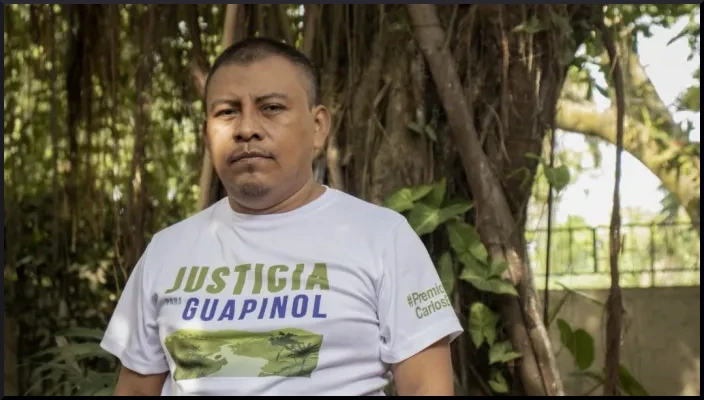
Colombia: “The coup has begun”
Colombia’s President Gustavo Petro is probably Israel’s strongest critic in Latin America. He not only denounces the Israeli regime as “genocidal,” but has described its actions in Gaza as comparable to Auschwitz. He broke diplomatic relations with Tel Aviv in May this year, provoking an immediate call from Washington urging him to change his mind, accompanied by warnings that this put at risk Colombia’s development and security.
Colombia’s ambassador to the U.S. recently spoke to Jacobin about the significance of his country’s severance of ties with Israel. He noted that previous governments would have made sure to “…brief the United States before it made any public announcement on any policy issue. But this time, when we severed ties with Israel, we didn’t tell the US.”
Yet Petro’s increasingly strident denunciations of Israel, including (in September) likening its military offensive in Gaza to “the horrors of the Holocaust,” and then saying that Netanyahu and his government “embody Nazism,” brought a major backlash. Washington responded by saying that “We cannot accept this. We cannot tolerate this” and the U.S. ambassador in Bogota labelled Petro as anti–Semitic. Nevertheless, like Xiomara Castro, Petro doubled down on his denunciations of Israel when he spoke at the UN General Assembly, saying “When Gaza dies, all of humanity will die.”
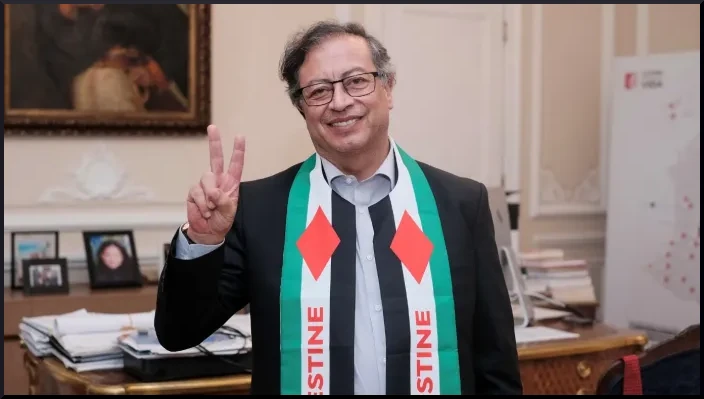
Like Honduras, Colombia had close ties with Israel under its previous governments. Petro’s predecessor, Ivan Duque, signed a free trade agreement with Israel in 2020. Colombia’s trade with Israel became second only to Brazil’s in the continent, with the principal export being coal. Petro halted coal exports in August this year, noting that the fuel was being used to make bombs to kill Palestinian children.
On October 1, Venezuela’s Nicolas Maduro warned of a planned coup in Colombia, accusing its former president Ivan Duque of working with Washington to carry it out. Then on October 9, President Petro claimed that “the coup had begun”, citing the attempt by the National Electoral Council to bring his presidency to an end via an investigation into alleged illegalities in his election campaign finances, allegations which he strongly contests.
It then emerged that, not long before the last election, Ivan Duque purchased Israeli “Pegasus” software and used it to spy on political opponents. While this leak (like the similar one in Honduras) may have been intended to remind Petro of his military’s continuing connections with Israel, it appears to have backfired. Petro has accused Duque of using state money illegally and of money laundering, citing as evidence that half of the $11 billion dollar payment was unaccountably sent to Israel by plane, in cash. Nevertheless, the news strengthened the impression that Petro, like previous presidents, is surrounded by corruption.
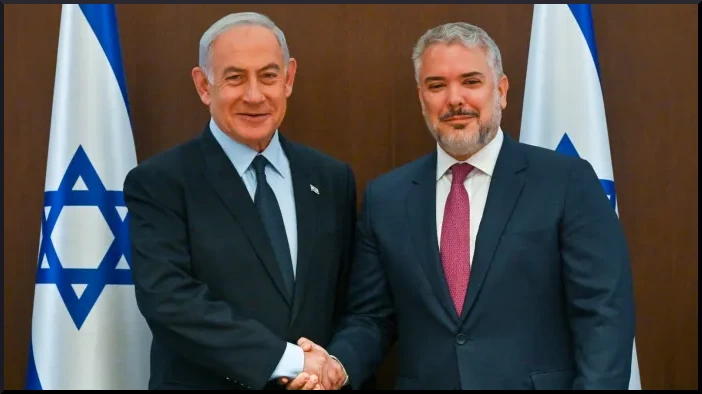
Second, like his Honduran counterpart, he faces constant right-wing resistance to his attempts at radical transformation of his country, up to and including “lawfare” against his presidency itself.
And in a third similarity, the weakness of Colombia’s justice system in tackling corruption was illustrated by the fact that a case against Chiquita Brands International for financing paramilitaries could only be brought to its recent conclusion in a U.S. court, just as happened in Honduras in the case against former president Hernández. Of course, the two countries also share a long history of close ties between their security systems and the U.S. military, including the hosting of large U.S. military bases.
Why are so few countries willing to challenge Israel?
If Latin America is in the vanguard of resistance to Israeli genocide, it is nevertheless geographically remote from West Asia and its resistance is largely symbolic and far from being of decisive significance.
Reflecting on this in Naked Capitalism, Nick Corbishley asks, “why are so few countries willing to take meaningful diplomatic or economic actions, including imposing targeted sanctions, against a rogue state that has not only slaughtered tens of thousands of Gazan civilians but is hell-bent on creating a regional conflagration in the Middle East?” In response, he suggests four explanations:
- Fear of U.S.-led retaliation—such as South Africa has faced since its action against Israel at the ICJ.
- Fear of economic reprisals—such as the threats made against Ireland, that it would lose the high-tech industries that underpin much of its economy because of its criticisms of Israel.
- The risk of Israel suspending sales and support services for its high-tech weaponry—which happened to Colombia as soon as it ended coal exports.
- The threat of Israeli retaliation against ministers or even leaders of governments who fall out of line on Gaza and other issues—as happened in all three countries examined here, with possible further threats arising from the widespread availability of Israeli Pegasus software and its potential for revealing embarrassing information about Israel’s opponents.
Israel is a formidable foe, and not only on the battlefield. The Guardian revealed its nine-year surveillance and intimidation of no less a body than the International Criminal Court. At the moment, hard evidence of Israeli attempts to undermine progressive Latin American governments is limited, but the potential is obvious. It is likely to be most effective against government’s whose political position is precarious.
Gustavo Petro perfectly understands the reasons why so few countries have stood firmly against Israel’s genocide. In a discussion with other progressive Latin American leaders, he said that the Western powers are giving a warning to the rest of humanity: “What happens to Palestine will happen to any of you, if you dare make changes without our permission.”
*Featured Image: President Gustavo Petro posing with Palestine Ambassador to Colombia, Raouf Almalki. [Source: thesun.my]
John Perry is based in Masaya, Nicaragua and writes for the Council on Hemispheric Affairs, London Review of Books, FAIR and elsewhere. John can be reached at johnperry4321@gmail.com or by his twitter handle @johnperry21.
